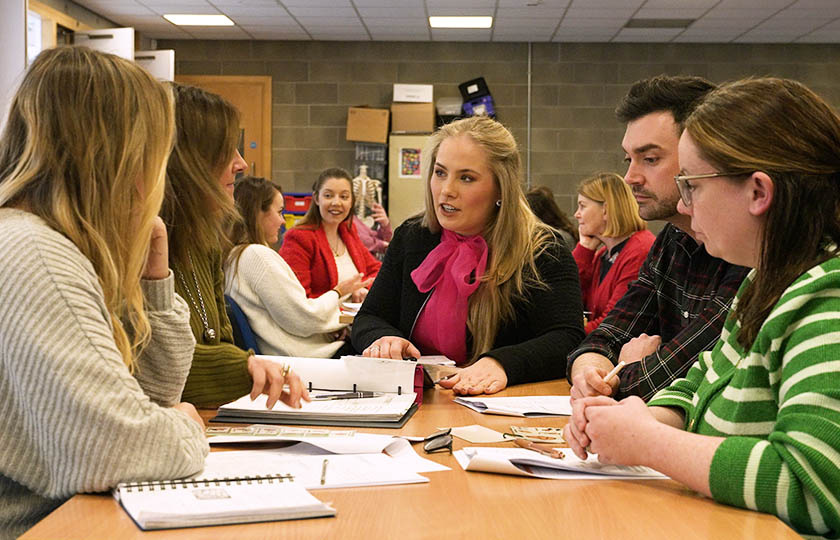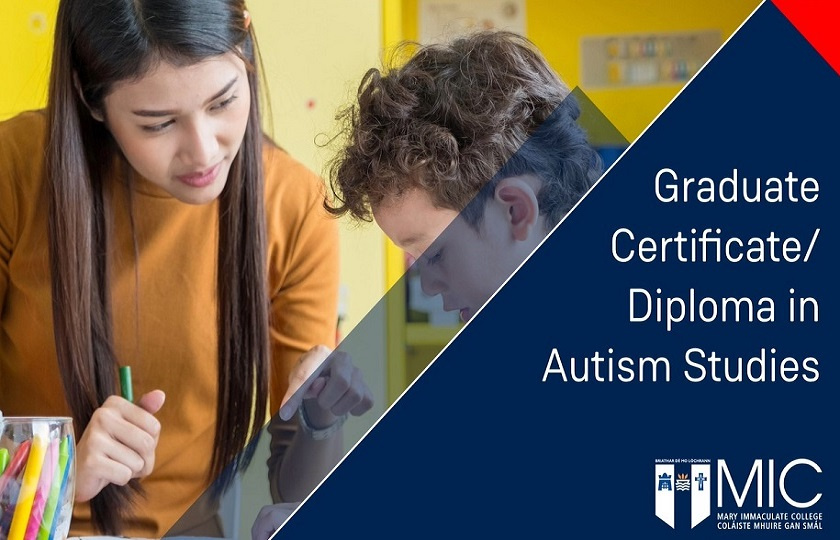Graduate Certificate / Graduate Diploma / MA in Autism Studies
Available: Part-time
NFQ Level: 9*
Duration: 1 year
Location: MIC Limerick
Delivery Mode:
Blended
Assessment:
Certificate: Essay, presentation, case study & sample supports for autistic individuals. Diploma: Research proposal and review of current literature. MA: Research proposal & dissertation.
- Programme Overview
- Programme Content
- Entry Requirements
- How to Apply
- Ask a Question
Programme Overview
The Graduate Certificate, Graduate Diploma, and MA in Autism Studies are accredited by the University of Limerick and are delivered by an award-winning partnership between Mary Immaculate College and Middletown Centre for Autism. The programmes have been designed and developed in collaboration with the autistic community, and are taught by professionals from MIC and Middletown Centre for Autism using both online and face-to-face teaching methods. Both agencies recognise the need for high-quality research opportunities and professional development in autism studies. The graduate programmes are offered in response to this need.
Key Features
Mary Immaculate is a College of Education and the Liberal Arts and has been providing teacher education since 1898. Mary Immaculate has considerable experience and expertise in the provision of teacher education in the area of Special and Inclusive Education including autism.
Middletown Centre for Autism is funded by the Departments of Education in Northern and Southern Ireland to promote excellence in the education of people with autism. As such, the Centre works on a referral basis with children who have complex needs in school and the Centre is one of the main providers of training for parents and educational professionals on the island of Ireland.

Programme Information
Graduate Certificate in Autism Studies (GCAS) - Runs every year from Sept-April
GCAS is a one-year part-time Level 9 programme. Applicants who have an honours degree (Level 8) in any discipline can apply to GCAS. The programme is worth 30 credits (ECTs) and there are four modules in total. There are approximately 3-4 onsite Saturdays in MIC over the academic year. The graduate certificate is designed to provide students with an in-depth understanding of autism and explores overlapping areas from experiential, educational and supportive perspectives. It is both theory and practical-based and is suitable for practitioners who work in this area and for those who are part of the autistic community. Students who are awarded a minimum 2.2 (second class honours) in GCAS are eligible to apply to the graduate diploma.
Graduate Diploma in Autism Studies (GDAS) - Due to run Academic Year 2025-2026
The one-year part-time Level 9 Graduate Diploma in Autism Studies (GDAS) is designed to provide students with an in-depth understanding of research methods and current topics in autism research. This unique programme combines training and teaching in practical research methods, the impact of research on current practices, and the opportunity to complete a project incorporating a practical model for reflection on practice. The programme is worth 30 credits (ECTs) and there are three modules in total. There are approximately 2-3 onsite Saturdays in MIC over the academic year. Evening supervision and support sessions are offered to students throughout. Students who are awarded a minimum 2.1 in the graduate diploma in autism studies are eligible to apply to the masters.
MA in Autism Studies (MAAS) - Due to run Academic Year 2026-2027
The one-year part-time Level 9 MA in Autism Studies (MAAS) is designed to equip students with the requisite knowledge and skills to design and conduct an empirical study on a topic within the field of autism studies. Students will develop expertise in research design, data collection and analysis, and will demonstrate the capacity to interpret and critique research findings in the context of policy, practice, and research. In semester two, students write a dissertation and are supervised by members of the MAAS team from MIC or Middletown Centre for Autism.
The live component of the programmes will be delivered on campus. There are approximately 6 onsite days in MIC. The master’s lectures are recorded/live streamed for those who cannot attend. Students will also be required to engage weekly with a range of research papers, podcasts, videos and reflective exercises as part of the programme. The online content is delivered through, and supported by, Mary Immaculate College’s Moodle platform.
Applicants who have not completed the graduate diploma in autism studies but have a graduate diploma in a relevant area, are eligible to apply, but must demonstrate an excellent understanding of autism. Applicants will be asked to complete a portfolio and will be interviewed in advance of being offered a place on the master’s programme. This is decided on a case-to-case basis
What does the GCAS/GDAS/MAAS qualify me to do?
GCAS/GDAS/MAAS
This course does not qualify you for a particular career such as teaching. It provides very valuable skills when supporting autistic people in any setting, thereby giving ‘an edge’ over others when it comes to job applications or job promotions. We welcome autistic and non-autistic students. Students bring a wealth of expertise to the programmes as they come from varied backgrounds such as, the autistic community, teachers, doctors, librarians, special needs assistants, nurses, therapists, social workers, professors, parents and siblings.
The Graduate Certificate/ Graduate Diploma / MA in Autism Studies programmes are designed to provide academic awards to people interested in studying autism.The awards acknowledge an in-depth exploration of autism and the characteristics, theories and interventions that enhance student learning, and help students to support autistic people.
Critically, students on the programmes will be empowered to foster an inclusive and equitable approach to research which promotes the voice of the autistic person, reflecting a ‘nothing about us without us’ philosophy. This is in an effort to ensure that students from a wide range of professional and personal backgrounds can engage in cutting edge research in the field of autism studies, and apply their research in whatever professional or personal context is most relevant and appropriate for them.
For particular jobs or promotion opportunities, the GCAS/GDAS/MA awards allow you to make a case or argument that you have evidence (in the form of an academic qualification) of being more knowledgeable about autism than competitors may be.

Testimonial: Caroline Morris - Graduate
As a parent and professional working with neurodiverse families I found this course provided a rich insight into Autism, the historical context, how understanding in this area and research has changed over time and how profiles of autistic people can be similar but different.
The modules covered in GCAS and GDAS enhanced my ability to implement theory and strategies into practice, engage critically with research and empowered me to be an advocate with neurodiverse individuals and their families.
The course lecturers are very understanding and supportive and the online and face to face lectures provided a balance around family life. As the course can be intense, it is important to be organised and reach out for support if needed.
Knowledge is powerful and this course is enriching, insightful and empowering.
Testimonial: Mark Dunne - Master's Student
My name is Mark Dunne. I'm a primary school teacher and I completed the GDAS course in Mary Immaculate College.
I would recommend the course to anyone with an interest in Autism Studies. The GDAS course focuses primarily on research and throughout the year you are given the tools to critically evaluate the research. This is a lifelong skill, no matter your profession, as you can confidently and accurately decipher research and decide whether to implement it into your own practice.
The hybrid nature of the course also allows flexibility in study while at the same time receiving timely feedback from highly skilled supervisors.
I would definitely recommend the course to anyone interested.

Contacts
Mary Immaculate College
Programme Co-Ordinator: Ms Kim Maguire
E: Kim.Maguire@mic.ul.ie
Administration: Ms Elaine Gleeson
E: AutismStudies@mic.ul.ie
Middletown Centre for Autism (NI)
Ms Edel Quinn
T: +44 28 3751 5750
E: Edel.Quinn@middletownautism.com
NFQ Levels
*Graduate Certificates are Level 9 Minor Awards, Graduate Diplomas and Masters are Level 9 Major Awards and PhDs are Level 10 Major Awards on the National Framework of Qualifications (NFQ), awarded by the University of Limerick.
- Programme Overview
- Programme Content
- Entry Requirements
- How to Apply
- Ask a Question



